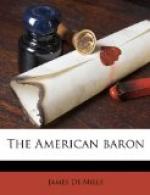“And then, you know, darling,” continued Minnie, “he went away, and used to write regularly every month. He came to see me once, and I was frightened to death almost. He is going to marry me next year. He used an awful expression, dearest. He told me he was a struggling man. Isn’t that horrid? What is it, Kitty? Isn’t it something very, very dreadful?”
“He writes still, I suppose?”
“Oh dear, yes.”
Mrs. Willoughby was silent for some time.
“Oh, Minnie,” said she at last, “what a trouble all this is! How I wish you had been with me all this time!”
“Well, what made you go and get married?” said Minnie.
“Hush,” said Mrs. Willoughby, sadly, “never mind. I’ve made up my mind to one thing, and that is, I will never leave you alone with a gentleman, unless—”
[Illustration: “HE BENT HIS HEAD DOWN, AND RAN HIS HAND THROUGH HIS BUSHY HAIR.”]
“Well, I’m sure I don’t want the horrid creatures,” said Minnie. “And you needn’t be so unkind. I’m sure I don’t see why people will come always and save my life wherever I go. I don’t want them to. I don’t want to have my life saved any more. I think it’s dreadful to have men chasing me all over the world. I’m afraid to stop in Italy, and I’m afraid to go back to England. Then I’m always afraid of that dreadful American. I suppose it’s no use for me to go to the Holy Land, or Egypt, or Australia; for then my life would be saved by an Arab, or a New Zealander. And oh, Kitty, wouldn’t it be dreadful to have some Arab proposing to me, or a Hindu! Oh, what am I to do?”
“Trust to me, darling. I’ll get rid of Girasole. We will go to Naples. He has to stop at Rome; I know that. We will thus pass quietly away from him, without giving him any pain, and he’ll soon forget all about it. As for the others, I’ll stop this correspondence first, and then deal with them as they come.”
“You’ll never do it, never!” cried Minnie; “I know you won’t. You don’t know them.”
CHAPTER IV.
IN THE CRATER OF VESUVIUS.
Lord Harry Hawbury had been wandering for three months on the Continent, and had finally found himself in Naples. It was always a favorite place of his, and he had established himself in comfortable quarters on the Strada Nuova, from the windows of which there was a magnificent view of the whole bay, with Vesuvius, Capri, Baiae, and all the regions round about. Here an old friend had unexpectedly turned up in the person of Scone Dacres. Their friendship had been formed some five or six years before in South America, where they had made a hazardous journey in company across the continent, and had thus acquired a familiarity with one another which years of ordinary association would have failed to give. Scone Dacres was several years older than Lord Hawbury.
One evening Lord Hawbury had just finished his dinner, and was dawdling about in a listless way, when Dacres entered, quite unceremoniously, and flung himself into a chair by one of the windows.




